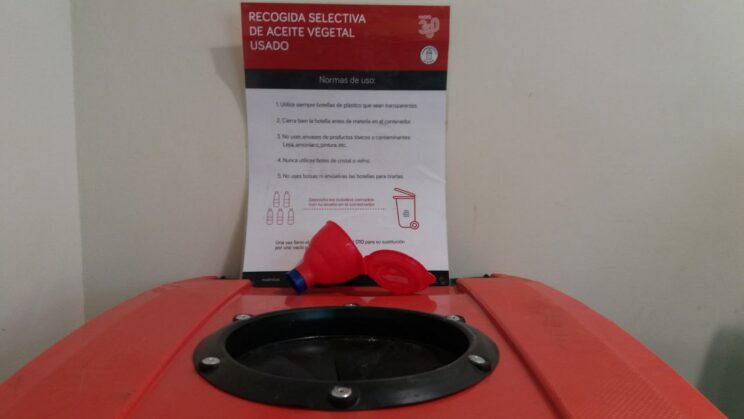
Used vegetable oil (sunflower, olive, corn…) is the oil left over after cooking.
After its first use, we can start the ‘R’ for reuse and use this oil again a couple of times, but then it becomes cloudy and we need to separate it properly for later recycling.
¡Remember! Pouring it down the sink or toilet is not an option, as this produces serious water pollution issues in rivers, seas and oceans, as well as problems for the Wastewater Treatment Plants (WWTP), where this oil floats on the surface of the water creating an impermeable film that prevents proper oxygenation, which in turn impacts the flora and fauna that inhabit these ecosystems.
According to the Ministry for Ecological Transition and the Demographic Challenge (MITECO), a single litre of oil can contaminate up to 1,000 litres of water.
So how can we reuse used vegetable oil?
- You can reuse this oil for other things such as greasing hinges and locks, or protecting unvarnished wooden furniture, covering over the pores to lend it a nice shine.
- You can recycle it to make candles: in this case, you can reuse a glass jar or any other container that can shape our candle. You can put a wire with cotton thread in the centre to act as the wick and then pour the used and filtered oil into the container. You could also add a few drops of your favourite aromatic oil so that, when you light it, it gives off a pleasant scent.
- You can also recycle it to make homemade soap, but be careful! Children must refrain from trying this and even adults should take every precaution, as caustic soda is a corrosive substance, so we need to use gloves and protective goggles and keep the room well aired at all times.
And… How should I dispose of used vegetable oil in the city of Madrid?
In the city of Madrid, properly disposing of used oil is very simple!
You can take it to:
- Specific containers for depositing used oil are available on public streets and municipal facilities (cultural centres, social service centres, municipal boards, sports centres or senior centres) identified in grey with a red circle.
- Specific containers for depositing used oil, located at galleries and municipal markets, which are identified in black with an orange lid with a hole in it. They can also be found at cultural centres and other municipal facilities.
- Clean points (Puntos Limpios)
-Fixed clean points: the limit being what the household produces.
-Mobile clean points: limit 5 litres/day.
-Local clean points: limit 5 litres/day.
Remember that it should always be placed in a closed plastic bottle and for easier filling, you can use a small funnel like the one you can find at our information booths; if you still don’t have one, come to our booth. You will find us here.
And by properly separating used vegetable oil and depositing it at the places described above, you help to ensure that it can later be used for producing fuels such as biodiesel, industrial varnishes, paints, inks, waxes, cosmetic products or lubricants.
Taking care of the planet by using our imagination is easy if we all take part!
